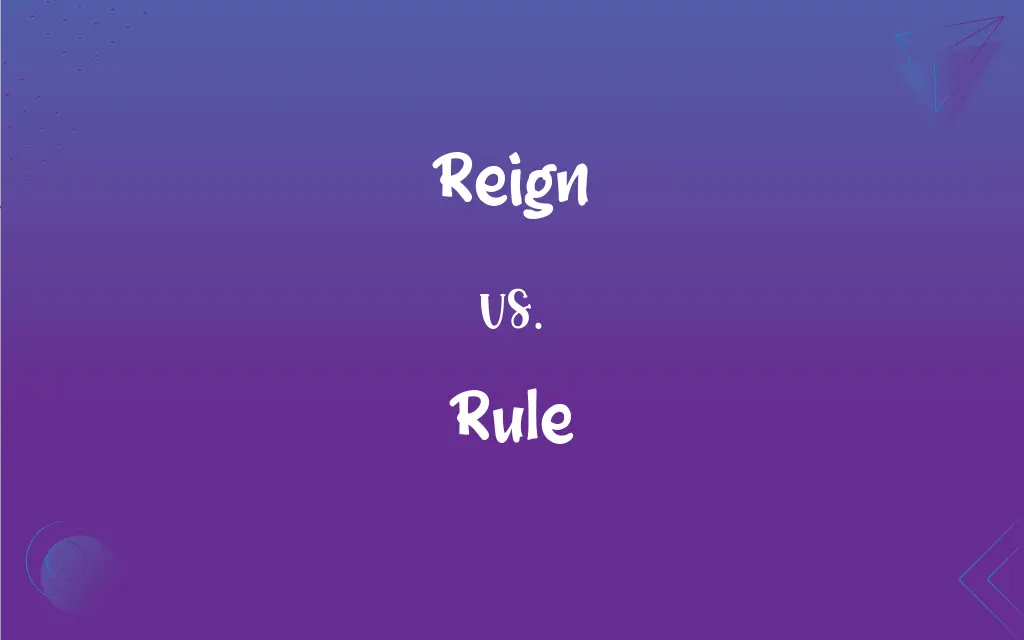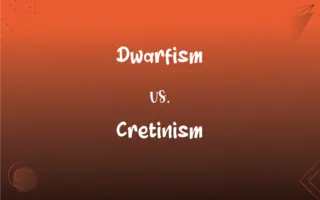Reign vs. Rule: What's the Difference?
Edited by Aimie Carlson || By Harlon Moss || Published on February 6, 2024
Reign refers to the period of time a monarch is in power, while rule denotes the act of governing or exercising authority over a country or group.

Key Differences
Reign specifically denotes the period during which a sovereign or monarch holds the throne. It's more about the duration of a monarch's tenure rather than the actions taken. Rule, in contrast, is a broader term that refers to the exercise of authority or governance. This can be by any form of leader, not just a monarch, and involves making decisions, enforcing laws, and guiding a nation or group.
The term reign is used in a more ceremonial or symbolic context, often reflecting the historical period marked by a monarch's rule. For example, Queen Victoria's reign is a distinct historical period. Rule, however, encompasses the practical aspects of governance, including the implementation of policies and maintenance of order, irrespective of the form of government.
Reign often carries connotations of legitimacy and hereditary right, especially in a monarchy. It’s associated with the idea of a royal lineage. On the other hand, rule can apply to any form of authority figure, including elected officials, dictators, or tribal leaders, and focuses on the manner and style of governance.
In terms of application, reign is a term primarily used in historical and monarchic contexts. It’s less about the specifics of governance and more about the era or period of a monarch’s rule. Rule, however, is a more general term used across various political and organizational contexts to describe the exercise of power and authority.
Linguistically, reign is often used in conjunction with terms like 'era' or 'period,' emphasizing time duration. In contrast, rule is frequently paired with words denoting style or approach, such as 'authoritarian rule' or 'democratic rule,' focusing on the method of governance.
ADVERTISEMENT
Comparison Chart
Context
Monarch's time on the throne
Exercise of authority or governance
Focus
Duration of tenure
Manner and style of governance
Applicability
Primarily monarchies
All forms of leadership
Connotation
Legitimacy, lineage
Authority, control, management
Usage
Historical, ceremonial
Broad, across various contexts
ADVERTISEMENT
Reign and Rule Definitions
Reign
Reign denotes the time of rule by a sovereign.
Her reign was known for peace and prosperity.
Rule
Rule can mean the period during which a person governs.
The rule of the dynasty lasted for several centuries.
Reign
Reign refers to the duration of a monarch's rule.
The reign of Queen Elizabeth II is the longest in British history.
Rule
Rule denotes control or command over a country.
The ruler’s strict rule was met with resistance.
Reign
Reign is the period a monarch is in power.
The reign of King Henry VIII was marked by significant changes.
Rule
Rule refers to the act of governing or managing.
Under her rule, the city saw many improvements.
Reign
Reign describes the period a royal figure is in power.
During his reign, the kingdom expanded its territories.
Rule
Rule is the exercise of authority and governance.
His rule was characterized by fair and just policies.
Reign
Reign signifies the tenure of a sovereign’s rule.
The reign of the emperor was a time of great cultural development.
Rule
Rule implies the administration of laws and policies.
The new government brought a different style of rule.
Reign
Exercise of sovereign power, as by a monarch.
Rule
The duration of such power.
Reign
The period during which a monarch rules.
Rule
Governing power or its possession or use; authority.
FAQs
Is reign used in non-monarchical contexts?
Rarely, reign is mostly used in the context of monarchy.
What is a reign?
Reign is the period during which a monarch holds the throne.
Can reign apply to elected officials?
No, reign typically applies to monarchs or sovereigns.
How long can a reign last?
A reign lasts as long as a monarch is in power, which can vary greatly.
Can a rule be over non-political entities?
Yes, rule can apply to any governing situation, including organizations.
What does rule mean?
Rule refers to the exercise of authority and governance.
Can rule be informal?
Yes, rule can also refer to informal leadership or influence.
Can rule refer to a period of time?
Yes, rule can also denote the duration of someone’s governance.
Does rule always imply dictatorship?
No, rule can be democratic, authoritarian, or any form of governance.
Are reigns always hereditary?
Typically, but not always, as in elective monarchies.
What are the signs of effective rule?
Effective rule often includes stability, prosperity, and fair governance.
Are reigns always peaceful?
Not necessarily, reigns can include times of conflict and turmoil.
What marks the end of a reign?
A reign ends with the monarch’s death or abdication.
Is a tyrannical leader said to reign?
More commonly, they are said to rule, often with a negative connotation.
Do all countries have reigns?
No, only monarchies have reigns in the traditional sense.
What is the difference in responsibilities between reign and rule?
Reign often symbolizes sovereignty, while rule involves active governance and decision-making.
How is a reign recorded in history?
Reigns are often recorded as distinct periods in a nation’s history.
Can a business leader rule?
In metaphorical terms, yes, a business leader can be said to rule their corporation.
Can a regent reign?
A regent may rule in place of a monarch but doesn’t have a reign per se.
How does one assume rule?
Rule can be assumed through various means, including election, inheritance, or seizure of power.
About Author
Written by
Harlon MossHarlon is a seasoned quality moderator and accomplished content writer for Difference Wiki. An alumnus of the prestigious University of California, he earned his degree in Computer Science. Leveraging his academic background, Harlon brings a meticulous and informed perspective to his work, ensuring content accuracy and excellence.
Edited by
Aimie CarlsonAimie Carlson, holding a master's degree in English literature, is a fervent English language enthusiast. She lends her writing talents to Difference Wiki, a prominent website that specializes in comparisons, offering readers insightful analyses that both captivate and inform.































































